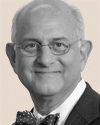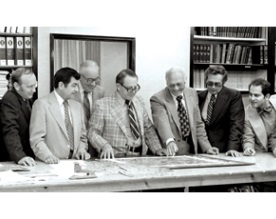
Fredric S. "Fred" Berger, chairman emeritus and board director of global professional services firm Louis Berger, and a long involved engineering executive in his own company and within the industry, died on April 23 in Washington, D.C. He was 67. According to the firm, the cause was pancreatic cancer.
Berger, formerly chairman of Berger's operating company, was actively involved since 1972 in the firm founded by his father, Louis, that included work on four continents and project management in nearly 70 countries, according to a corporate obituary.
"He continued to play an active role in the company throughout his illness, helping usher in a new era of modernization and restructuring within the corporation, while championing the company’s global brand consolidation," says the obituary. "He also expanded the company’s partnerships in China."
Berger ranks at No. 59 on ENR's list of the Top 150 Global Design Firms, with $615.1 million in 2013 billings, half outside the U.S. It also reported more than $241 million in global program management revenue, and hasand about 6,000 global employees.
A 2003 ENR cover profile on the company noted that Berger "treats the company's work as a cause," and often criticized global development policies of the George W. Bush administration and World Bank that were not industry-beneficial.
The firm had an early involvement in rebuilding war-torn Afghanistan. He told ENR that he would not let firm employees there "adopt a siege-mentality approach. We're there to help them rebuild their country."
In more recent ENR articles, Berger expressed concern over delays in US transportation funding and in a 2009 US Transportation Dept. plan for high-speed rail that did not actively embrace magnetic-levitation technology, which he said had energy-efficiency and other advantages over traditional rail. "It is 21st-century, and why shouldn’t we be doing that?" he said.
Berger, known for his signature bow-ties, was an active proponent of industry issues and globalism, through engineering groups and government and education panels. Among other association involvements, he was a vice president of the American Council of Engineering Companies for two years and served as a chairman of the International Engineering and Construction Industry Council, where he led a delegation to Japan to open opportunities for U.S. firms to participate in the Japanese infrastructure expansion program.
He also advised the U.S. Dept. of Commerce and the Export-Import Bank on trade issues, and served on several university boards.
Berger "was the global voice of consulting engineers and it was louder than any other as an advocate for the engineering consulting industry," says Gregs Thomopulos, chairman of Stanley Consultants and former ACEC chairman. "He truly enjoyed what he did with an energy level that was unsurpassed."
Adds David A. Raymond, ACEC president and CEO: "Fred gave back in so many ways to the engineering profession which he truly loved. He was an internationalist, just like his father, and championed the role of engineers as great innovators and master-builders."
“My father saw the world as full of adventures waiting to be had," says his daughter, Sofia, who now is a vice president and division manager in Latin America. "From an early age, he taught us all to travel as much as possible and to always jump at the opportunity to go to a new place or experience a new culture."
She adds that her father "absolutely loved his work ... [and] felt so strongly about the role that we as engineers play in the world and the impact we can have. He wanted to leave each place we worked stronger and more self-sufficient, whether through rural roads or technology transfer.”
Donations in his memory can be made to the American University of Afghanistan.





